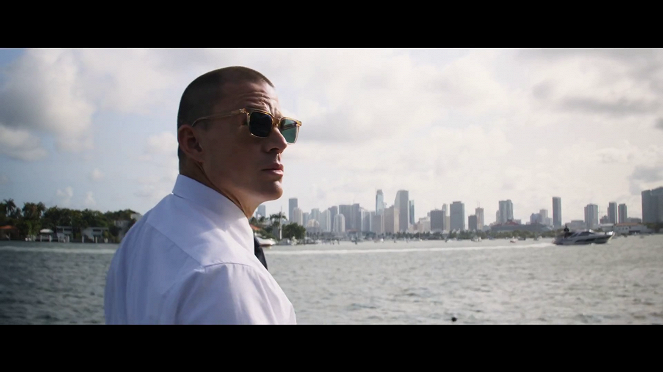Directed by:
Steven SoderberghScreenplay:
Reid CarolinCinematography:
Steven SoderberghCast:
Channing Tatum, Salma Hayek, Caitlin Gerard, Alan Cox, Christopher Villiers, Vicki Pepperdine, Ayub Khan-Din, Nancy Carroll, Gavin Spokes (more)VOD (4)
Plots(1)
“Magic” Mike Lane (Tatum) takes to the stage again after a lengthy hiatus, following a business deal that went bust, leaving him broke and taking bartender gigs in Florida. For what he hopes will be one last hurrah, Mike heads to London with a wealthy socialite (Hayek Pinault) who lures him with an offer he can’t refuse… and an agenda all her own. With everything on the line, once Mike discovers what she truly has in mind, will he—and the roster of hot new dancers he’ll have to whip into shape—be able to pull it off? (Warner Bros. UK)
(more)Videos (1)
Reviews (2)
After the dramatically successful first part and the easy-going second part comes the third (and, according to the title, probably the last) part, which is just an old-world naive and sweet fairy tale. Perhaps it’s good that it's something a bit different in terms of genre for the third time, but this time the shift didn't really suit me. Soderbergh has swapped the likeable, pompous characters from the previous installments for universally annoying new characters who fulfill the most played-out film clichés (the misunderstood impulsive housewife, the over-smart multi-talented teenager, the aloof wise butler). And speaking of clichés, cameo appearances via Zoom have become a very dated cinematic tool in recent months. The cinematography is again nice, the choreography of the dance numbers is very good, it has some funny Soderbergh "wtf" moments, but I can't help it, plot-wise it fits just right on the Hallmark Channel at 14:30.
()
The first Magic Mike was an uncomplicated social drama, the second a road movie and this, the third one, is a Lubitsch-esque conversational comedy built on the foundation of a backstage musical. Or Pretty Woman in reverse, if you like (a rich housewife buys the company of a stripper with a heart of gold, and the question of “love or money?” stands at the centre of the story). However, there is also criticism of the capitalism/patriarchy that turns everything into a commodity (London is humorously presented through a series of shots of souvenirs) and promises to women, who are at the centre of the narrative for the first time, freedom (the perhaps most expensive shop in the city is aptly called Liberty) and fulfilment of their most secret fantasies, but only if they give up their wealth and power. In other words, it really has to be a fantasy realised somewhere in the theatre, without any overlap with the real world, where men still make the decisions. Magic Mike’s Last Dance can also be seen as Soderbergh’s effort to subversively play around with the concept of legacy sequels, at which he both succeeds and fails (and reflects his own position, when, like Mike, he has to build on a successful brand, sell himself and rely on patrons instead of building something new because of the systemic conditions). The protagonist wouldn’t have done anything spectacular without someone else’s money and a job offer; he simply would have continued to make a living as a bartender and remained a lone wolf. The old gang only appears briefly during a Zoom call and there are minimal references to the preceding instalments (a flashback with a striptease in a police costume). The dance scenes, thanks to which this is one of the most erotic Hollywood films without sex (and it will make your nipples erect regardless of your gender or orientation) are parodically overwrought (the opening “pornographic” dance à la Fifty Shades of Grey and its moist variation at the end). The deliberate formulaicness with the division of the story into basic archetypes is made visible by the straightforward voiceover, which transform’s Mike’s return to the stage almost into a fairy tale or mythical story. It’s definitely not as silly and shallow as it may seem when viewing it on a superficial level. 75%
()



Ads